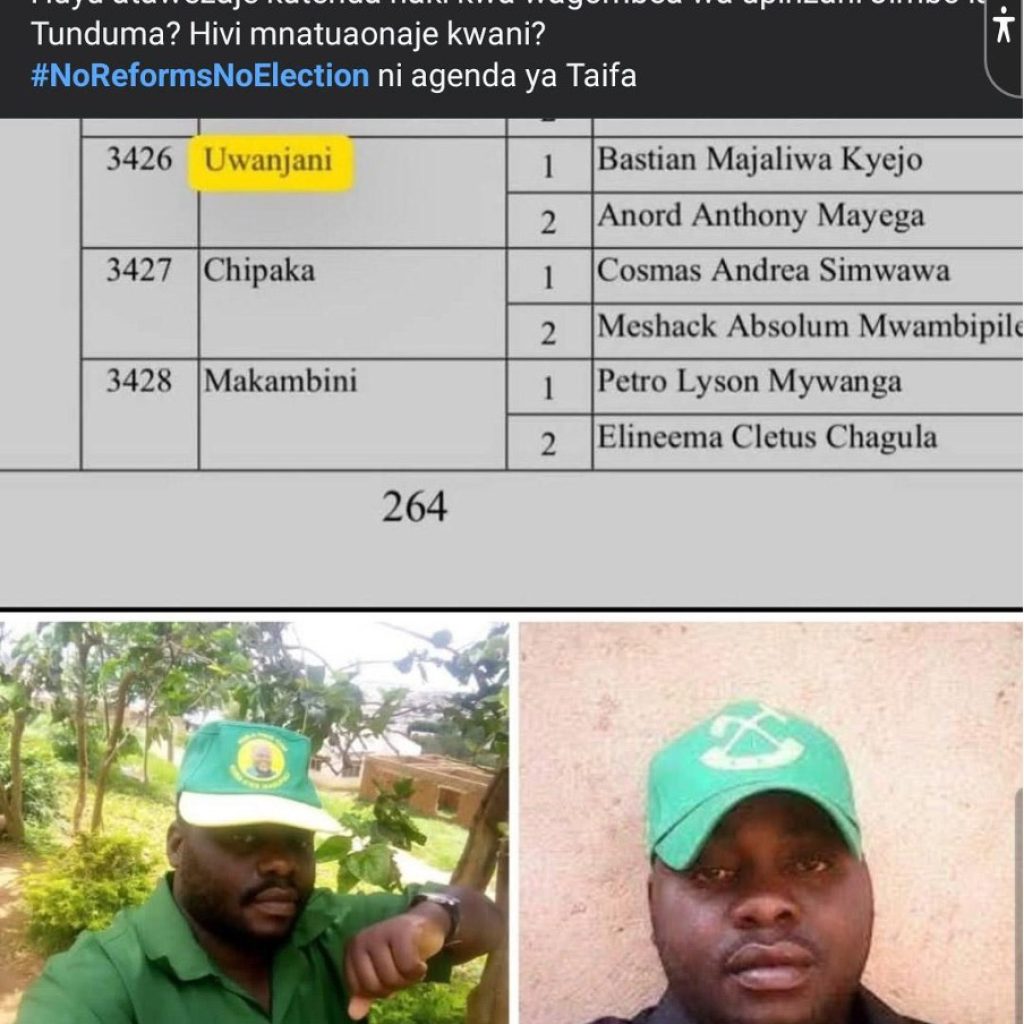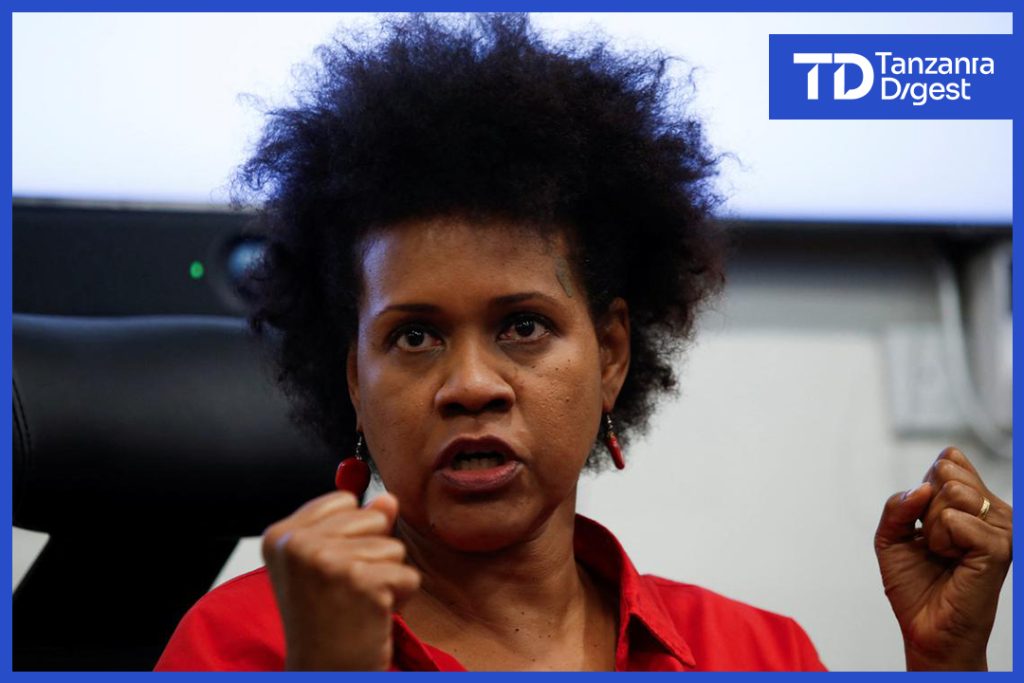Based on Maria Sarungi-Tsehai’s social media post and the broader context from search results, here’s a breakdown of the situation regarding Antony Mayega’s appointment and its implications:
1. Core Allegation by Maria Sarungi-Tsehai.
– Maria alleges that “Antony Mayega”, appointed as election supervisor for Uwanjani Ward in Tunduma, is an active CCM member who contested the party’s 2015 primaries in Momba.
– She questions his neutrality, arguing that his CCM affiliation compromises his ability to oversee elections fairly for opposition candidates in Tunduma.
2. Broader Context: #NoReformsNoElection Movement.
– This incident fuels the ongoing “#NoReformsNoElection” campaign, a digital uprising demanding electoral reforms before Tanzania’s October 2025 polls. The movement highlights:
– “Partisan appointments” in electoral bodies.
– Violence against opposition rallies (e.g., CHADEMA attacks in Singida/Igung a).
– Suspension of CHADEMA’s activities by courts, exacerbating distrust in institutions.
3. Systemic Issues in Electoral Governance.
– CCM Dominance:
The ruling party controls key electoral institutions like the National Electoral Commission (INEC). Critics argue this enables biased appointments.
– Historical Precedents:
Past elections saw CCM “big shots” reinstated by party committees after losing primaries, undermining public trust.
– Maria’s Activism:
As a prominent critic of President Samia’s government, Maria has previously exposed threats to democracy, including her abduction in Kenya (linked to her advocacy). Maria is a living survivor of attempted abductions in Nairobi, Kenya and his abductors are yet to be apprehended.
4. Implications for Tunduma’s Election.
– Credibility Risk:
Mayega’s ties to CCM could lead to:
– Favoritism toward CCM candidates.
– Vote-rigging accusations if results are disputed.
– Opposition Response:
CHADEMA and allies may boycott Tunduma’s polls or intensify #NoReformsNoElection protests.
5. International & Human Rights Concerns.
– UN/AI Warnings:
Human Rights Watch and Amnesty International cite Tanzania’s “repressive trend” ahead of elections, including abductions and judicial suppression of opposition.
– Maria’s Safety:
Her activism makes her a target; her abduction underscores risks to reformers.

Key Stakeholders in Uwanjani Ward.
| No. | Name. | Role | Affiliation. |
| 1.0 | Antony Mayega. | Election Supervisor. | Ex-CCM candidate. |
| 2.0 | Bastian Majaliwa Kyejo. | Election Supervisor. | Unknown. |
| 3.0 | Cosmas Andrea Simwawa. | Election Supervisor. | Unknown. |
| 4.0 | Meshack Absolum Mwambipild. | Election Supervisor. | Unknown. |
| 5.0 | Petro Lyson Mywanga. | Election Supervisor. | Unknown. |
| 6.0 | Elineema Cletus Chagula. | Election Supervisor. | Unknown. |
Conclusion.
Maria’s protest reflects “systemic flaws in Tanzania’s electoral system”: partisan appointees, unchecked ruling-party influence, and suppression of dissent. The #NoReformsNoElection movement amplifies these issues, linking Mayega’s case to nationwide demands for neutral oversight and judicial independence. Without reforms, Tanzania’s 2025 elections risk further unrest and legitimacy crises.
Can INEC sieve political parties members without the election law requiring the registrar of political parties to demand and manage membership roster?
Based on the provided legal context, INEC “cannot” effectively sieve political party members without a specific election law mandating the registrar of political parties to demand and manage membership rosters, and that roster be open to public scrutiny. Here’s a breakdown of the key reasons:
⚖️ 1. Current Legal Framework Lacks Explicit Mandate.
– INEC requires political parties to follow “laid-down guidelines and legal/administrative requirements” for registration. However, “no specific law or regulation” is cited that authorizes INEC to demand, access, or manage detailed membership rosters for “screening” (vetting or filtering members). Without statutory provisions, INEC lacks the enforceable authority to compel parties to submit membership data for scrutiny.
🛠️ 2. Operational Limitations Highlighted by INEC’s Statements.
– INEC publicly stated it had “no party registration application before [it]” and emphasized that parties must comply with existing guidelines. This suggests:
– Procedural dependency:
INEC’s ability to scrutinize parties (including membership) is confined to what existing laws explicitly permit.
– Passive enforcement:
The commission can only react to applications submitted with the documentation currently required by law—not proactively demand additional data like membership rosters.
⚠️ 3. Public Challenges to INEC’s Oversight.
– Comments on INEC’s announcement (e.g., claims about the All Democratic Alliance Party’s registration attempt ) reveal “public skepticism about INEC’s transparency” in party registration. This underscores:
– Accountability gaps:
Without legal requirements for membership roster management, INEC cannot uniformly verify claims about party legitimacy or internal compliance.
– Risk of arbitrariness:
Sieving members without a legal mandate could lead to accusations of bias or overreach, as seen in criticisms of INEC’s handling of applications.
📜 4. Comparative Precedent from Jordan’s Electoral Model (Indirect Reference).
– While not directly about Nigeria, illustrates how electoral commissions “require explicit legislative backing” for expansive powers. Jordan’s Independent Election Commission (IEC) derives its authority to ensure “transparency and integrity” from constitutional provisions (Article 67/2) and specific laws (e.g., Law No. 11 of 2012) . This contrasts with INEC’s unclear statutory basis for membership management.
💡 Conclusion: Legal Reforms Are Prerequisite.
For INEC to “sieve” party members effectively, “election laws must first be amended” to:
1. Explicitly empower the registrar to demand and manage membership rosters.
2. Define standardized criteria for membership verification.
3. Establish penalties for non-compliance by parties.
Until such reforms, INEC’s capacity remains limited to the “narrow scope of existing regulations”, leaving membership oversight largely to political parties’ self-reporting—a system vulnerable to abuse.
Read more analysis by Rutashubanyuma Nestory

